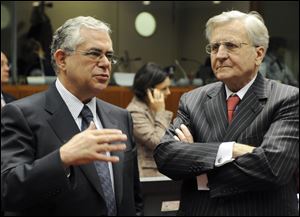
Veteran banker tapped to be Greece's new prime minister
Papademos made reputation as Trichet's deputy
11/10/2011
Former European Central Bank President Jean-Claude Trichet, right, shares a few words with former Vice- President of the European Central Bank Lucas Papademos, left, prior to the start of the European Union EcoFin council of ministers meeting in this Dec. 2, 2009 file photo.
ATHENS, Greece — How fortunes change.
As Greece's central bank chief in 2001, Lucas Papademos helped shepherd the Mediterranean country into an era of promise and plenty inside the eurozone. A decade later, the former deputy at the European Central Bank is leading a last-ditch effort to keep his country in the currency union, and dodge a fast-approaching bankruptcy.
For nearly eight years, Papademos was the quiet number two at the European Central Bank.
Now, everyone wants to hear what the MIT-educated economist has to say following confirmation that the 64-year-old has been called upon to lead a Greek coalition government under near-catastrophic conditions.
His mission for his expected three-month term is no less than saving Greece from bankruptcy.
The hope is that his experience of global financial circles and his non-involvement in the partisan politics of Greece will lend themselves to calm jittery markets and steer Greece to a semblance of stability.
Born in Athens in the middle of the Greek civil war in October 1947, Papademos initially trained as a physicist, before getting a Masters in electrical engineering and a doctorate in economics, all from the Massachusetts Institute of Technology. His thesis supervisor, and mentor, was the late Franco Modigliani, who received the Nobel Prize for Economics in 1985 for his work on household savings and the dynamics of financial markets.
Papademos taught at Columbia University from 1975 to 1984, successively as a lecturer, assistant and associate professor, before returning to Greece to become chief economist at the Bank of Greece from 1985 to 1993. He had already had a taste of central banking as a senior economist with the Federal Reserve Bank of Boston, in 1980.
In 1993, the newly elected socialist government appointed Papademos deputy governor of the Bank of Greece. He rose to the helm a year later after helping fend off a speculative attack on the drachma, Greece's pre-euro currency.
As governor from 1994 to 2002, Papademos presided over a regime of declining interest rates and increasing independence from government interference that was crucial in helping Greece secure membership in the eurozone.
His record helped him become vice president of the European Central Bank in 2002. His eight-year term ended in 2010.
Papademos, a professor at the University of Athens since 1988, was offered, and declined, a place in George Papandreou's socialist government, preferring to serve as an unpaid adviser.